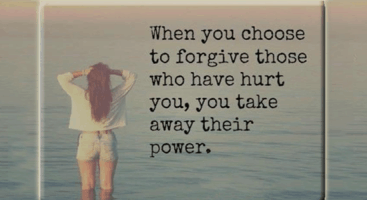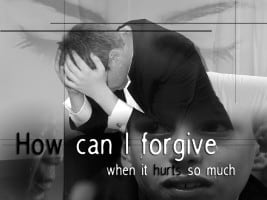Podcast: Play in new window | Download
Subscribe: RSS

There was a time in my life that I knew I needed to forgive myself for past mistakes and choices, but I also needed to forgive all of my accusers and abusers. I could not move any further in my freedom while trying to hold onto the resentments, anger, and bitterness I had been carrying.
- This is when I learned to really forgive, so that I would be free, and so that those I forgave could be free, as well. Forgiveness is an act of our will. You can’t wait until you feel like forgiving, because you will never feel like doing it.

Image: Mom-Nest - We think the person doesn’t deserve forgiveness. It was then that God taught me that I would never use the force of my will more dramatically than when I agreed with Him to start forgiving. It is not about feeling; it is about being willing. Forgiveness is power. It takes divine power to forgive. Here was another lesson of faith for me to learn.
- First you will it, and then you feel it. One isn’t based on the other. For some people I had willed it, and forgave by faith long before I finally felt released from that person. I don’t think anything demands more perseverance than giving God the solitary right to vengeance. It is difficult to let go of our “right” to feel justified in our anger.
A new way of looking at it for me was this: unforgiveness against people who hurt me only strengthened the tie of my bondage to them.
- My sense of entitlement to nurture unforgiveness only worked to further entangle and enmesh me with the very people I wouldn’t forgive. The people I had wanted to avoid, because they had hurt me so badly, were the very people I was taking with me emotionally everywhere I went. I was subject to them through my own bitterness and lack of forgiveness.
- I would go to degrading and shameful lengths in order to make someone hear me, and I hoped they would ask for forgiveness and change their ways. I only ended up digging a deeper pit. The person had been used by the enemy to hurt me, and they would continue as if nothing they did caused anything to happen in my life. They quite possibly despised me for my weakness. In the case of incest, I was viewed within the family as weak and traitorous, because I didn’t keep their secret, and I, through my confrontation, I had forced them to look at their abuse. They sought to make the crime my fault and my responsibility. Forgiving them released me from them. They are in God’s hands now.
I needed to forgive like Christ forgave when He said, “Father, forgive them, for they know not what they do.” Many times in my life, people hadn’t had a clue of the pain they had caused me. They didn’t have any idea of how much they had hurt me, and even if I explained in great detail, they probably still wouldn’t have gotten it. There is no way we can ever make another person really know the depth of our pain. Trying to make them see only makes our pain worse. I had to forgive even their ignorance. Otherwise, I would still carry that person around with me, to this day.
- One of the truths I learned is that to forgive someone does not mean that you are saying that what they did to you is okay, quite the contrary. Unless there is true repentance on their part, they remain the same person. When you forgive another person, you are simply releasing them to God, to free yourself from carrying them anymore.
- Therefore, forgiving those who had hurt me didn’t mean I had to associate with them anymore; it just freed me from them. Jesus asked God to forgive those who crucified Him, but when He rose from the dead and before He ascended, He only spent time with His disciples, because He knew that his abusers’ hearts had not changed. He didn’t reveal Himself to these abusers. We must still protect ourselves from those whom we know will continue to hurt us, while at the same time forgiving them and letting them go.
It was during this time that God taught me that there is no formula for forgiveness, for prayer and release. It is a simple act of letting go. How freeing is that? Sometimes we make things of God so difficult, when it is really very easy. We feel the need to work and feel worthy. But Jesus has paid it all. We just need to walk in it. What a gift He has given us!

- How do you know when you’ve totally released the hurt? It doesn’t hurt any more. You might have to forgive someone a thousand times to make that a reality. But every time the pain comes to your mind you say, “God, I give it to you again. For the hundredth time, Lord, I’m letting them off the hook and relinquishing my right to get even.” Every time you rehearse it, you make the pain deeper. But every time you release it, the pain gets weaker in your life.
- Refocus on God’s purpose for your life.
You can either focus on the past or the future – not both. Focus in on what God wants to do in your life. As long as you focus on the person who has hurt you, they control you. You don’t want anyone who has hurt you in the past to control you in the present. You want God to control your life.
The truth is, if you don’t release the person who has hurt you, then you will resemble him. Whatever you focus on, you’ll become like. If you focus on pain, that’s what you move toward. If you focus on purpose, that’s what you move toward.
How do you do that? The Bible tells us in Job 11:13-16,
“Put your heart right, reach out to God…then face the world again, firm and courageous. Then all your troubles will fade from your memory, like floods that are past and remembered no more.”
Put your heart right. That just means do the right thing. Forgive the person. Let him off the hook.
Reach out to God. Ask Jesus Christ to come into the situation and fill you with his love.
Face the world again. Don’t withdraw. Don’t put yourself in a shell. You can’t love without being vulnerable. And a loveless life is diametrically opposed to God’s purpose for your life.